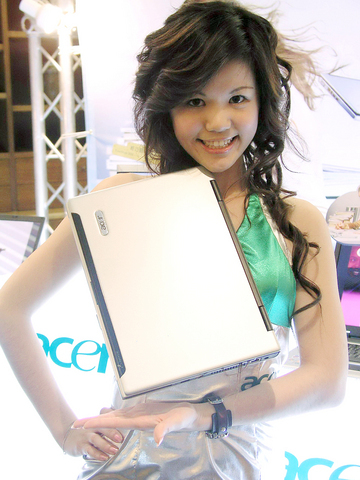Acer Inc, the world's fourth-largest computer maker, will continue promoting its desktop-computer business next year in a bid to become the No. 3 player in the market by 2007, company executives said yesterday.
The company aims to ship around 7 million desktop computers next year, around 4 million units more than this year, and hit the 10-million mark in 2007, Scott Lin (林顯郎), president for Taiwan and Hong Kong operations, told reporters at a product launch yesterday.
"We have been dedicating more resources to notebook products in the past three years and have now established a name in markets worldwide. Therefore, we want to put a greater emphasis on our desktop lineup next year," he said.

PHOTO: CHOU YI-CHUN, TAIPEI TIMES
While most brandname vendors are gearing up for a slice of the highly competitive notebook market, it will be a good chance for Acer to keep a balance between the desktop and laptop segments, with both offering similar margins, Lin said.
Citing local surveys, he added that 84 percent of desktop users who assemble their own computers do so to save money, while the rest are enthusiasts. Therefore, Acer will introduce branded desktops based on the do-it-yourself principle to capture a bigger market share, he added.
Statistics from market researcher International Data Corp released last month indicated that worldwide computer shipments jumped 17 percent in the third quarter on better-than-expected sales of notebooks and low-cost PCs.
The top three vendors were Dell Inc, Hewlett-Packard Co and Lenovo Group Ltd (聯想), with market shares of 18 percent, 16 percent and 7.7 percent respectively.
Acer, ranked fourth with 4.7 percent, has set a target to outpace China-based Lenovo to become the No. 3 player within the next two years.
Eyeing the growing computer demand, the company launched a slew of desktops and portable computers yesterday.
With prices starting as low as NT$20,000 (US$594), its Veriton 2800 series is a range of customized desktop computers geared toward business users. The Aspire L300 series, priced below NT$45,000, will target the digital home segment.
The new TravelMate 3300 and 3230 are 14.1-inch notebooks weighing 2kg or less that offer business users functionality such as Bluetooth capability and a DVD burner.
Acer reported local sales amounting to NT$6.3 billion in the third quarter, representing 78 percent growth over a year ago. Its shares were up NT$0.30, or 0.4 percent, to close at NT$72.80 on the Taiwan Stock Exchange yesterday.

TAKING STOCK: A Taiwanese cookware firm in Vietnam urged customers to assess inventory or place orders early so shipments can reach the US while tariffs are paused Taiwanese businesses in Vietnam are exploring alternatives after the White House imposed a 46 percent import duty on Vietnamese goods, following US President Donald Trump’s announcement of “reciprocal” tariffs on the US’ trading partners. Lo Shih-liang (羅世良), chairman of Brico Industry Co (裕茂工業), a Taiwanese company that manufactures cast iron cookware and stove components in Vietnam, said that more than 40 percent of his business was tied to the US market, describing the constant US policy shifts as an emotional roller coaster. “I work during the day and stay up all night watching the news. I’ve been following US news until 3am

UNCERTAINTY: Innolux activated a stringent supply chain management mechanism, as it did during the COVID-19 pandemic, to ensure optimal inventory levels for customers Flat-panel display makers AUO Corp (友達) and Innolux Corp (群創) yesterday said that about 12 to 20 percent of their display business is at risk of potential US tariffs and that they would relocate production or shipment destinations to mitigate the levies’ effects. US tariffs would have a direct impact of US$200 million on AUO’s revenue, company chairman Paul Peng (彭雙浪) told reporters on the sidelines of the Touch Taiwan trade show in Taipei yesterday. That would make up about 12 percent of the company’s overall revenue. To cope with the tariff uncertainty, AUO plans to allocate its production to manufacturing facilities in

Six years ago, LVMH’s billionaire CEO Bernard Arnault and US President Donald Trump cut the blue ribbon on a factory in rural Texas that would make designer handbags for Louis Vuitton, one of the world’s best-known luxury brands. However, since the high-profile opening, the factory has faced a host of problems limiting production, 11 former Louis Vuitton employees said. The site has consistently ranked among the worst-performing for Louis Vuitton globally, “significantly” underperforming other facilities, said three former Louis Vuitton workers and a senior industry source, who cited internal rankings shared with staff. The plant’s problems — which have not

COLLABORATION: Given Taiwan’s key position in global supply chains, the US firm is discussing strategies with local partners and clients to deal with global uncertainties Advanced Micro Devices Inc (AMD) yesterday said it is meeting with local ecosystem partners, including Taiwan Semiconductor Manufacturing Co (TSMC, 台積電), to discuss strategies, including long-term manufacturing, to navigate uncertainties such as US tariffs, as Taiwan occupies an important position in global supply chains. AMD chief executive officer Lisa Su (蘇姿丰) told reporters that Taiwan is an important part of the chip designer’s ecosystem and she is discussing with partners and customers in Taiwan to forge strong collaborations on different areas during this critical period. AMD has just become the first artificial-intelligence (AI) server chip customer of TSMC to utilize its advanced